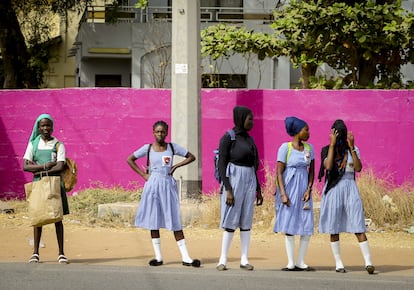‘A 30-year setback’ in The Gambia as religious and political leaders push to decriminalize female genital mutilation
The conviction of three women for prohibited excisions on eight babies sparks intense debate in this African country where 75% of adolescent girls have been subjected to the practice

Political and religious leaders in The Gambia are actively campaigning to decriminalize female genital mutilation (FGM). Despite being banned in the West African country since 2015, this harmful practice continues to be practiced secretly. The recent arrest and imprisonment of three women for mutilating eight infants, the first conviction since the law took effect, has sparked a new initiative to repeal the law. Imam Abdoulie Fatty, a supporter of excision, and legislator Sulayman Saho, who has called for decriminalization in the country’s parliament, are the driving forces behind this controversial issue. The debate surrounding FGM divides The Gambia, a small country with a population of 2.7 million, where a UNICEF report last year revealed that 75% of teenage girls aged 15 to 19 have been subjected to this illegal practice.
In late August, a judge in the Central River region convicted three women — one who performed the procedure and two mothers — for mutilating eight babies. The women faced a choice of paying a fine of 15,000 dalasis (about $243) or spending one year in prison. A few days later, Imam Abdoulie Fatty, the radical religious advisor to dictator Yahya Jammeh, known for his homophobia and defense of excision, paid the fine for the three women to secure their release from prison. He also encouraged Gambians to continue this practice. “If everyone agrees to do it openly, the government cannot imprison an entire town, let alone an entire country,” he said.
After Abdoulie Fatty made these statements, Isatou Touray, director of the anti-FGM Gamcotrap association, demanded his arrest. “This is an urgent matter as it incites violence. I urge the government, the Ministers of Gender and Health, the President of the Supreme Court, and the Inspector General of Police to take immediate action by arresting Imam Fatty. It is crucial that the law is applied when someone violates it. Women should be aware that this issue directly impacts their lives and the future of their children,” said Touray.
These statements provoked a debate that quickly spilled onto the streets and even reached the nation’s parliament. In mid-September, Sulayman Saho, an opposition legislator from the Central Baddibu district, stood before the National Assembly and proposed repealing the law that prohibits FGM. Saho expressed concern about the arrests of “mothers and sisters,” and connected female genital mutilation to the right to preserve religious and traditional practices. “The ban infringes upon these rights and fosters violence in our country… We must get to work and review the law that criminalizes female circumcision.” Saho proposes granting freedom to make decisions regarding FGM.
According to Adriana Kaplan, the head of Wassu Gambia Kafo, an organization that has been fighting female genital mutilation in The Gambia for decades, the proposed decriminalization would be a “30-year setback” in women’s rights. “It shows that this fight isn’t over, that the road is long, and that we must continue fighting from a perspective of respect and knowledge,” said Kaplan. She believes the current law is positive because it creates a legal framework within which to work. “It’s true that sometimes the law doesn’t seem to work, but that’s mainly because it can be challenging to apply. After all, the police and health professionals are also part of the community.”
‘Bodies reduced to political instruments’
The Gambia’s efforts to decriminalize genital mutilation sparked a prompt response from organizations opposing this practice. The Civil Society and NGO Coalition reminded the Gambian government of its legal responsibility to safeguard the rights and health of women and girls. “We strongly denounce the actions of those who exploit social and religious faith to further their own personal agendas at the expense of women’s well-being.,” they said in a statement. “Their lives are marked by enduring scars, yet their bodies are reduced to political instruments. Unfortunately, thousands more in The Gambia are still at risk of becoming victims of this ordeal.”
In December 2015, the Gambian Parliament amended the Women’s Act 2010 to criminalize genital mutilation. The amendment introduced two articles that impose penalties of up to three years in prison and a fine of 50,000 dalasis (about $810) for practicing or promoting genital mutilation. If the excision results in death, a life sentence is imposed. Additionally, a fine of 10,000 dalasis (about $162) is imposed on individuals who fail to report the practice.
Recent studies show a significant decrease in rates of female genital mutilation (FGM) among girls and adolescents worldwide. However, it is alarming that around four million children and youths still undergo FGM annually, according to UNICEF. Shockingly, approximately 200 million girls and women alive today have been victims of genital mutilation. The Gambia is one of the countries that has made the least progress in eradicating this practice in the past decade.
Female genital mutilation is primarily practiced in sub-Saharan Africa and certain Arab countries. However, cases have also been reported in Asia, Eastern Europe and Latin America. Over the past 25 years, international institutions like the World Health Organization (WHO), UNICEF and the UN Population Fund (UNFPA) have undertaken various initiatives to eradicate this practice.
Sign up for our weekly newsletter to get more English-language news coverage from EL PAÍS USA Edition
Tu suscripción se está usando en otro dispositivo
¿Quieres añadir otro usuario a tu suscripción?
Si continúas leyendo en este dispositivo, no se podrá leer en el otro.
FlechaTu suscripción se está usando en otro dispositivo y solo puedes acceder a EL PAÍS desde un dispositivo a la vez.
Si quieres compartir tu cuenta, cambia tu suscripción a la modalidad Premium, así podrás añadir otro usuario. Cada uno accederá con su propia cuenta de email, lo que os permitirá personalizar vuestra experiencia en EL PAÍS.
¿Tienes una suscripción de empresa? Accede aquí para contratar más cuentas.
En el caso de no saber quién está usando tu cuenta, te recomendamos cambiar tu contraseña aquí.
Si decides continuar compartiendo tu cuenta, este mensaje se mostrará en tu dispositivo y en el de la otra persona que está usando tu cuenta de forma indefinida, afectando a tu experiencia de lectura. Puedes consultar aquí los términos y condiciones de la suscripción digital.









































